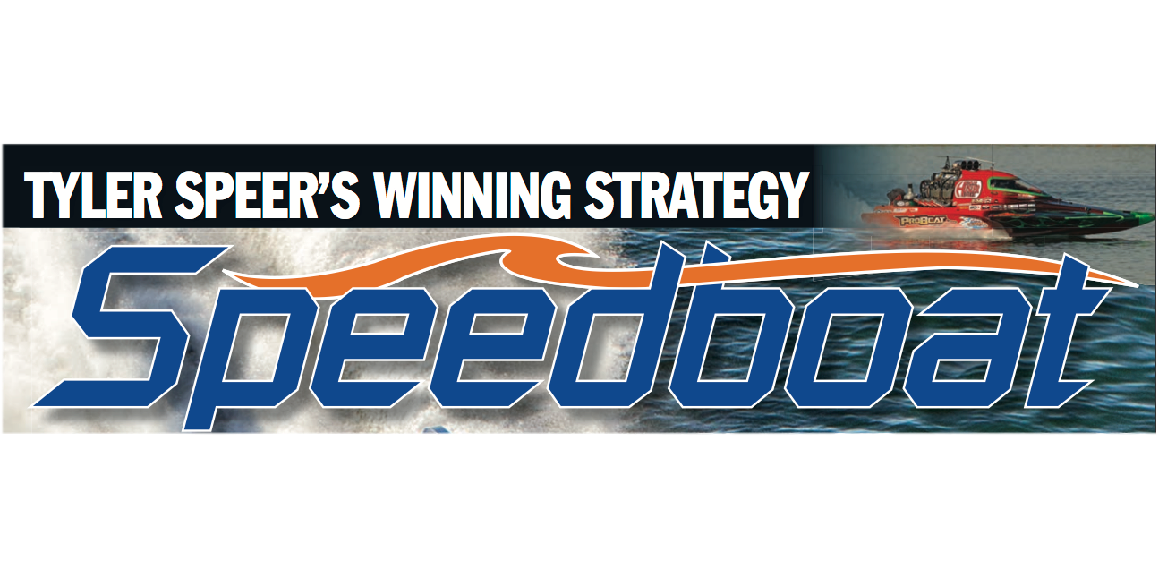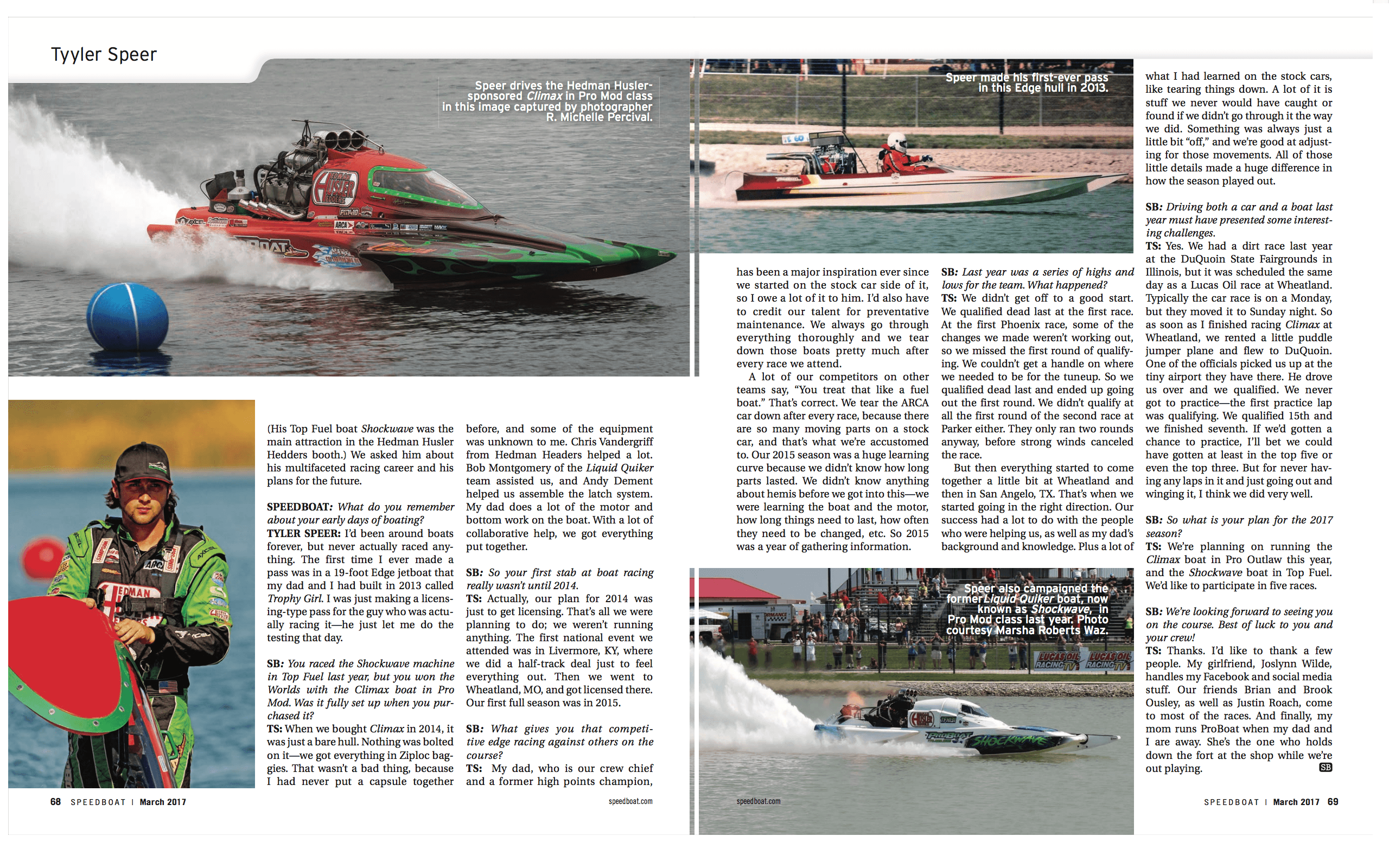The Year of The Speer
- By Tyler Speer
- •
- 01 Mar, 2017
- •

In the auto-racing universe, there’s a stock car series known as ARCA, formally known as the Automobile Racing Club of America. Naturally, this professional league has its own website, its own speed heroes and, inevitably, its own articles about the sport and its racers. A few years ago, ARCA published a feature story about its rising star, Tyler Speer. After rattling off some of his accomplishments, the story asked: “Did you know that when Speer isn’t in pursuit of his stock-car career, he’s often at the helm of a wicked-fast hydro racing boat in the Lucas Oil Drag Boat Series?”
Speedboat magazine might well ask the reverse question: Did you know that when Speer isn’t targeting the Lucas Oil World Championship trophy, he’s also racing on dirt and asphalt—sometimes during the same season?
It’s true. Speer has been pulling double-duty on the track and on the water, and his hard work has paid off in spades—especially on the liquid quarter mile.
The son of dragboat racer Tim Speer (founder of the Woodstock, GA-based service center ProBoat), Tyler began racing go-karts at the age of 12. He moved into the Allison Legacy Series when he turned 15, where he won one event and finished fourth in the championship points during the 2009 season. He launched his ARCA career in 2010 and has competed all over the country, including events like the Super Chevy Store 100 in Springfield, IL, the Talladega Aarons Dream Weekend in Lincoln, AL, and the Daytona International Speedway in Florida.
Embarking on his amphibious racing career, Speer rapidly adapted to the change of scenery, qualifying first in his debut race and winning races shortly thereafter. By season’s end, Speer and his Amphibious Motorsports team had earned a seventh-place finish in their first full Lucas Oil Drag Boats season. Speer spent 2015 honing and perfecting his boat-racing skills, then returned last year with eagerness and enthusiasm, juggling both auto and boat races—sometimes having to really hustle to make it to back-to-back events. His 2016 Lucas Oil season astonished many when he entered the World Finals in Phoenix with a narrow points lead—and then went on to finish the event as World Champion. Pro Modified class is arguably the toughest class in drag boat racing, and the 2016 finals participants included three racers with a World Championship on the line. Speer and his #410 Climax boat maintained a tight lead over Kevin Helm in Tommy Thompson’s Fist Full of Dollars and Jimmy Booher’s Hillbilly Express. Despite encountering several mechanical gremlins and speed bumps during the qualifying runs, Speer tackled every problem head on to capture the title when both Booher and Helm went out in earlier rounds.
Following his win, Speedboat caught up with Speer in the Lucas Oil booth as he signed autographs during the Performance Racing Industry (PRI) trade show in Indianapolis last December. (His Top Fuel boat Shockwave was the main attraction in the Hedman Husler Hedders booth.) We asked him about his multifaceted racing career and his plans for the future.

SPEEDBOAT: What do you remember about your early days of boating?
TYLER SPEER: I’d been around boats forever, but never actually raced anything. The first time I ever made a pass was in a 19-foot Edge jetboat that my dad and I had built in 2013 called Trophy Girl. I was just making a licensing-type pass for the guy who was actually racing it—he just let me do the testing that day.
SB: You raced the Shockwave machine in Top Fuel last year, but you won the Worlds with the Climax boat in Pro Mod. Was it fully set up when you purchased it?
TS: When we bought Climax in 2014, it was just a bare hull. Nothing was bolted on it—we got everything in Ziploc baggies. That wasn’t a bad thing, because I had never put a capsule together before, and some of the equipment was unknown to me. Chris Vandergriff from Hedman Husler Hedders helped a lot. Bob Montgomery of the Liquid Quiker team assisted us, and Andy Dement helped us assemble the latch system. My dad does a lot of the motor and bottom work on the boat. With a lot of collaborative help, we got everything put together.
SB: So your first stab at boat racing really wasn’t until 2014.
TS: Actually, our plan for 2014 was just to get licensing. That’s all we were planning to do; we weren’t running anything. The first national event we attended was in Livermore, KY, where we did a half-track deal just to feel everything out. Then we went to Wheatland, MO, and got licensed there. Our first full season was in 2015.
SB: What gives you that competitive edge racing against others on the course?
TS: My dad, who is our crew chief and a former high points champion, has been a major inspiration ever since we started on the stock car side of it, so I owe a lot of it to him. I’d also have to credit our talent for preventative maintenance. We always go through everything thoroughly and we tear down those boats pretty much after every race we attend.
A lot of our competitors on other teams say, “You treat that like a fuel boat.” That’s correct. We tear the ARCA car down after every race, because there are so many moving parts on a stock car, and that’s what we’re accustomed to. Our 2015 season was a huge learning curve because we didn’t know how long parts lasted. We didn’t know anything about hemis before we got into this—we were learning the boat and the motor, how long things need to last, how often they need to be changed, etc. So 2015 was a year of gathering information.

SB: Last year was a series of highs and lows for the team. What happened?
TS: We didn’t get off to a good start. We qualified dead last at the first race. At the first Phoenix race, some of the changes we made weren’t working out, so we missed the first round of qualifying. We couldn’t get a handle on where we needed to be for the tuneup. So we qualified dead last and ended up going out the first round. We didn’t qualify at all the first round of the second race at Parker either. They only ran two rounds anyway, before strong winds canceled the race.
But then everything started to come together a little bit at Wheatland and then in San Angelo, TX. That’s when we started going in the right direction. Our success had a lot to do with the people who were helping us, as well as my dad’s background and knowledge. Plus a lot of what I had learned on the stock cars, like tearing things down. A lot of it is stuff we never would have caught or found if we didn’t go through it the way we did. Something was always just a little bit “off,” and we’re good at adjusting for those movements. All of those little details made a huge difference in how the season played out.
SB: Driving both a car and a boat last year must have presented some interesting challenges.
TS: Yes. We had a dirt race last year at the DuQuoin State Fairgrounds in Illinois, but it was scheduled the same day as a Lucas Oil race at Wheatland. Typically the car race is on a Monday, but they moved it to Sunday night. So as soon as I finished racing Climax at Wheatland, we rented a little puddle jumper plane and flew to DuQuoin. One of the officials picked us up at the tiny airport they have there. He drove us over and we qualified. We never got to practice—the first practice lap was qualifying. We qualified 15th and we finished seventh. If we’d gotten a chance to practice, I’ll bet we could have gotten at least in the top five or even the top three. But for never having any laps in it and just going out and winging it, I think we did very well.
SB: So what is your plan for the 2017 season?
TS: We’re planning on running the Climax boat in Pro Outlaw this year, and the Shockwave boat in Top Fuel. We’d like to participate in five races.
SB: We’re looking forward to seeing you on the course. Best of luck to you and your crew!
TS: Thanks. I’d like to thank a few people. My girlfriend, Joslynn Wilde, handles my Facebook and social media stuff. Our friends Brian and Brook Ousley, as well as Justin Roach, come to most of the races. And finally, my mom runs ProBoat when my dad and I are away. She’s the one who holds down the fort at the shop while we’re out playing.
By: Brett Bayne
Article Source: Speedboat Magazine
March 2017 Issue
